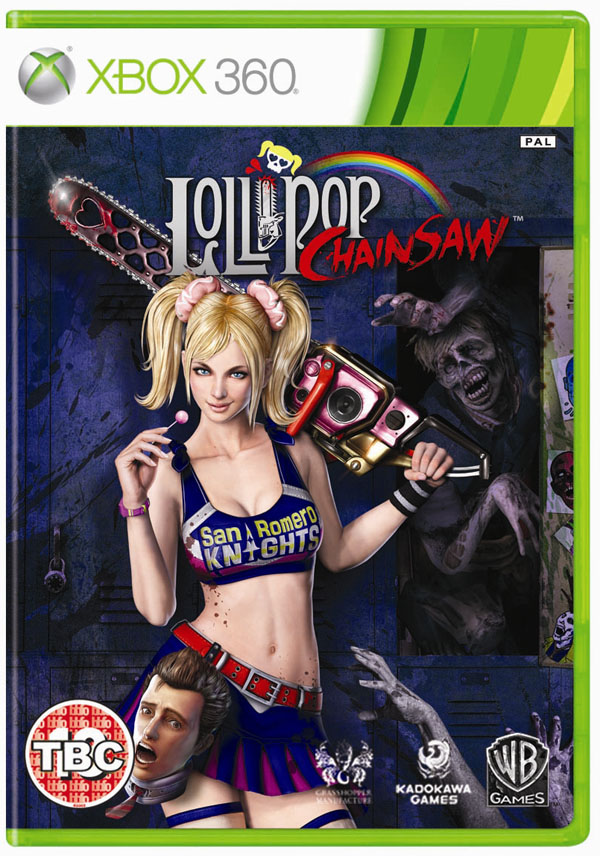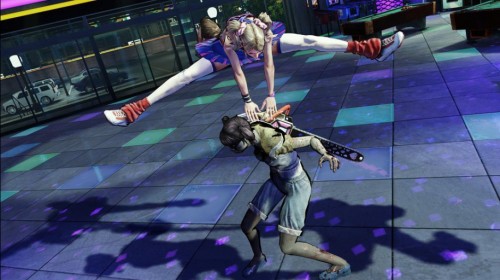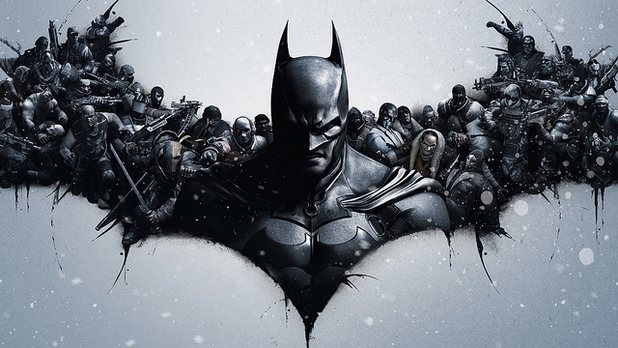
If video games were to be considered on the same artistic level as a film, book, or television (and let’s not argue this— they should be), then Goichi Suda (Suda51 to people on the Internet) would be their Roger Corman. In fact, Suda’s latest title is, in many ways, as much a homage to Corman-style exploitation films as it is to George Romero’s zombie films and even Sam Raimi’s Evil Dead films.
In many ways, Lollipop Chainsaw feels like a game Suda51 dreamed up during his days working as an undertaker, perhaps after one too many episodes of Buffy The Vampire Slayer, the aforementioned Corman and Raimi films, and perhaps a couple of Japanese idol gravure videos. Maybe, years later, he picked up D3 Publisher’s cult classic Oneechanbara and decided he could do it better. Perhaps not the loftiest goal, but he succeeds rather well.
The heroine of the game is one Juliet Starling, and today is her 18th birthday. The game goes to great lengths to point out that she is, in fact, freshly-turned 18, just in case you feared you might get arrested for gawking too long at one of the many, many upskirt shots that follow. The game revels in showing off its lead character as much as possible, and while it thankfully never goes to the extent of the Oneechanbara games, it’s not as classy as, say, a DoAX title, either.
Unfortunately for Juliet, her birthday has been ruined by the arrival of a zombie apocalypse. To make matters worse, her boyfriend, Nick, was bitten by a zombie and will soon turn into one if she can’t save him. Luckily, Juliet just happens to come from a family of zombie hunters, and has been trained since birth by the mysteriously Japanese Morikawa, so she knows just what to do to save him: cut off his body. Thus, Nick spends the rest of the game as head attached to Juliet’s belt,
That’s not even approaching the craziness that follows. From battling zombie-rock gods inspired by Sid Vicious, Euronymous, Yoko Ono and even Bootsy Collins, to riding combine harvesters, getting sucked into arcade games and taking the bad kinds of mushrooms, Lollipop Chainsaw never lets up.
Over the course of the game, we learn that the zombie apocalypse has been brought about by Juliet’s classmate, Swan. After being rejected by basically everyone around him, Swan does what any Robert Smith-wannabe outcast does after listening to one too many The Cure records: he summons the aforementioned zombie-rock gods, and tries to use them to destroy the world as we know it over the game’s six levels.
That might not sound like a lot of game to get through, but Lollipop Chainsaw isn’t intended to be played once and forgotten. This game is, at its core, an arcade experience, something made explicit during the stage set in an arcade. The game even offers a ranking mode that lets you play it for score or for speed running, hinting very much that the idea here is to play for the high score.
Your first playthrough won’t let you get to the top of the leaderboards, though. You’ll need to unlock the combo attacks that generate more medals and points, leading you to unlock even more moves and character upgrades, allowing you to get the big scores on subsequent playthroughs.
At first, the controls may seem somewhat clunky and slow. It takes a little while to realise that Juliet is, in effect, a teenage girl wielding a big, heavy two-handed weapon. She isn’t agile like you might expect, and this can take some getting used to. After a while, though, a rhythm will develop and it becomes much easier to pull off the more complex attacks while weaving in dodges and other defensive moves. You might be able to get far by just pressing buttons, but you’ll take a lot of damage (and use up a lot of the health-restoring lollipops) doing so, and this won’t wash on higher difficulties.
The graphics are bright and colourful for the most part, and the game rarely takes place in the kind of murky, poorly-lit environment you might expect to find zombies in. It’s all rainbows and sunshine in this zombie apocalypse, a fact made explicit when rainbows literally shoot out of zombies as you kill them.
Music is a particularly interesting aspect of the game. Being a Suda51 title, it would be impossible for Lollipop Chainsaw not to pay homage or directly include music that matches its theme. From 1950s bubblegum pop to 1970s punk and 1990s metal, as well as New Wave and 1980s synth pop, the game has a soundtrack that matches its themes quite well. Perhaps the most notable inclusion is the 1983 Toni Basil track Mickey, which played whenever you activate Juliet’s Star Meter, allowing you to more easily decapitate zombies while grinning idiotically and yelling the lyrics at the top of your lungs (or maybe that’s just me…)
With all the action and craziness that’s been packed into the game’s tight six levels, Lollipop Chainsaw rewards repeated play. I mentioned the arcade-style experience before, and it’s worth repeating that this is how you’re expected to approach the game. Play it again and again to see the things you missed before, and to unlock the new moves, power-ups, costumes and other extras that the game offers.
The downside is that Lollipop Chainsaw isn’t going to be a game for everyone. Some people will find the overt sexuality and deliberate tastelessness to be off-putting, and that’s fine. Suda51 has made it clear for years that his games aren’t going to be games that everyone will like. If you don’t like his games, then that’s fine too. There’s always Generic Military FPS 6 and Generic Sports Simulation Game 2012 right there on the shelf as well.
I’m just glad that Lollipop Chainsaw is, for now at least, on the shelf right next to them.
Stylish and fun gameplay | Hilarious story
Not for everyone | Somewhat slow controls










